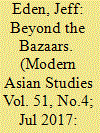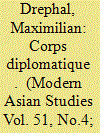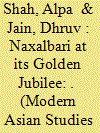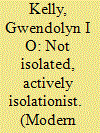|
|
|
Sort Order |
|
|
|
Items / Page
|
|
|
|
|
|
|
| Srl | Item |
| 1 |
ID:
155119


|
|
|
|
|
| Summary/Abstract |
The slave trade in nineteenth-century Central Asia involved hundreds of thousands of slaves, predominantly Persian Shīʿites, and stopping the trade was alleged to be a major motivating factor in the Russian conquest of the region. Nevertheless, Central Asian slavery remains little-studied and little-understood. In this article I will argue, first, that the region's slave trade was characterized by decentralized trade networks and by abundant inter-nomadic trade; and, second, that Russian efforts to end the slave trade by decree and through military force in the 1860s and 70s were not as successful as has often been assumed.
|
|
|
|
|
|
|
|
|
|
|
|
|
|
|
|
| 2 |
ID:
155120


|
|
|
|
|
| Summary/Abstract |
This article studies diplomatic history in its physical dimensions. Its point of departure is the interpretation of the term ‘corps diplomatique’ in a literal sense. The article introduces the concept of the diplomatic body as a diplomat's body and as a body with diplomatic functions and meanings. Based on material relating to the British Legation in Kabul from 1922 until 1947, the body's ubiquity in international relations is revealed through the themes of space, language, and medicine. The article first looks at the impact of Kabul's spatial conditions and the physical reactions it excited in British diplomats. It then considers the bodies of Afghanistan's ruling elite as objects of British attention, whose appearance was documented in diplomatic records. Descriptions of these bodies in diplomatic language expressed intimacy and consensus as well as estrangement in British–Afghan relations. In addition to the metaphorical use of the diplomatic body, the provision of healthcare through the Legation's medical unit addressed the needs of British and Afghan bodies alike. It was also employed to further diplomatic ends by extending colonial medicine to the Afghan population. The study of the Legation's physical practices ultimately reveals the diplomatic mission's colonial origins and character.
|
|
|
|
|
|
|
|
|
|
|
|
|
|
|
|
| 3 |
ID:
155118


|
|
|
|
|
| Summary/Abstract |
Swidden cultivators in the Southeast Asian highlands may work far from lowland centres, but certain crops attract powerful interests. During the First Indochina War (1946–54), French and Vietnamese political actors climbed the hills in pursuit of the Black River region's opium production and trade. Even after combat formally ended, opium contests continued into an independent Vietnam, intersecting with larger struggles over ethnic difference, state resource claims, and market organization. Using upland cultivators to examine post-colonial statemaking, this article tells a new story about opium's tangled relationship with socialist rule in Vietnam. Drawing on French and Vietnamese archival records, it traces the operation of successive opium regimes through war and into restive peace. Based on evidence of opium tax and purchase operations conducted by the Democratic Republic of Vietnam (DRV) from 1951 to 1960, it argues that regulating the commodity sensitized cultivators to their long, fraught relations with state power. Far from passive, cultivating subjects animated revolutionary ideals, engaged smuggling networks, negotiated resource rights, and mounted an oppositional social movement. Peaking in 1957, the movement and subsequent crackdown illustrate tensions embedded in post-colonial relations of exchange and rule.
|
|
|
|
|
|
|
|
|
|
|
|
|
|
|
|
| 4 |
ID:
155125


|
|
|
|
|
| Summary/Abstract |
Durga puja, or the worship of goddess Durga, is the single most important festival in Bengal's rich and diverse religious calendar. It is not just that her temples are strewn all over this part of the world. In fact, goddess Kali, with whom she shares a complementary history, is easily more popular in this regard. But as a one-off festivity, Durga puja outstrips anything that happens in Bengali life in terms of pomp, glamour, and popularity. And with huge diasporic populations spread across the world, she is now also a squarely international phenomenon, with her puja being celebrated wherever there are even a score or so of Hindu Bengali families in one place. This is one Bengali festival that has people participating across religions and languages. In that sense, Durga puja has an unmistakable cosmopolitan hue about it. With more than 10 million people visiting the different pandals (the temporary, covered pavilions or marquees created for the goddess) in Kolkata alone on any one of the four days of festivity (now effectively extended to a whole week), Durga puja could well be the biggest carnival on earth. Kolkata's image has become synonymous with this grand autumnal festival of the goddess.
|
|
|
|
|
|
|
|
|
|
|
|
|
|
|
|
| 5 |
ID:
155126


|
|
|
|
|
| Summary/Abstract |
There are not many other issues in South Asia that have attracted as much scholarly attention in the last decade as India's Naxalite or Maoist movement. At least 50 scholarly or political books, several novels, and numerous essays have been published since 2007. What we hope to do in this article is to ask why this movement has generated such attention at this moment in time, to analyse the commentaries that have emerged and the questions that have been asked, and also to identify some of the shortfalls in the existing literature and propose some lines of research to be pursued by future scholars.
|
|
|
|
|
|
|
|
|
|
|
|
|
|
|
|
| 6 |
ID:
155122


|
|
|
|
|
| Summary/Abstract |
The Nilgiri hill communities have for a long time been the focus of anthropological inquiry, though they have rarely been the focus of historical inquiry that delves more deeply into the past than the colonial period. And, while the fields of history and anthropology have moved beyond tropes of primitive and timeless, our studies of those formerly so-called ‘timeless primitives’ have remained stuck in time. I argue, therefore, for an interdisciplinary modified Subaltern Studies approach, integrating data from anthropology, archaeology, linguistics, and genetics, to develop a longue durée social history of the Nilgiri hills. For the Nilgiri communities, as with other tribal communities, narratives about their past have tended to emphasize their isolation until the modern period. In this article, drawing together data from several disciplines, I argue that the communities of the Nilgiris, especially the Toda, so frequently held up as examples of cultural isolation, were not truly isolated, neither from neighbouring tribal communities, nor from the states and empires of the plains below. I argue that the maintenance of distinctive religious, subsistence, and linguistic practices, despite contact with a wider world, is evidence of an active process of isolationist group formation/maintenance and resistance to other ways of being.
|
|
|
|
|
|
|
|
|
|
|
|
|
|
|
|
| 7 |
ID:
155123


|
|
|
|
|
| Summary/Abstract |
This article, largely based on archival research, highlights two contradictory outcomes of colonial state formation in central Borneo. The first is characterized by territorial consolidation and efforts to neatly sedentarize peoples within each colonial territory, while the second is characterized by pacification that unwittingly liberalized the flows and movements of people and commodities transgressing colonial state boundaries. The 1924 Kapit Peacemaking Agreement in colonial Sarawak is often noted for its significance in bringing a final end to the practice of inter-ethnic headhunting, principally between the Iban of Sarawak and the Kenyah from Dutch Borneo. While it marked the successful outcome of a long phase of colonial pacification and territorial consolidation for both colonial states in Borneo, the agreement's outcome simultaneously highlights the contradictory inter-colonial motives and expectations regarding the resulting increase of cross-border flows of people and commodities. The presented case highlights challenges facing Dutch colonial state formation when attempts to subjugate and sedentarize riverine peoples, who were geographically tied to fluid commodity chains and flows, directly undermined the former's own efforts to establish authority in its borderland frontier.
|
|
|
|
|
|
|
|
|
|
|
|
|
|
|
|
| 8 |
ID:
155121


|
|
|
|
|
| Summary/Abstract |
This article examines letters written by young men to the Marathi-language journal Samaj Swasthya and its editor, R. D. Karve, a major advocate of birth control and sex education in western India. The letters, and Karve's responses to them, constituted perhaps the earliest sex-advice column in Indian print media. We argue here that the correspondence provides a unique vehicle for understanding the forms of sexual knowledge held by middle-class males in mid-twentieth-century India as well as for appreciating their most significant sexual anxieties. The article analyses the concerns expressed in the letters about masturbation and seminal emissions, the nature of the female body and processes of conception, birth control and same-sex sexual practices. It particularly illuminates the ways in which the concept of modern conjugality pervaded the sexual understandings of the young men who wrote to Karve. It thus offers valuable insights into specifically sexual aspects of conjugality and masculinity—aspects that have previously been unexplored.
|
|
|
|
|
|
|
|
|
|
|
|
|
|
|
|
| 9 |
ID:
155124


|
|
|
|
|
| Summary/Abstract |
This article explores situations in which forced migrants revisit places and homes they had fled from, drawing on research carried out among Kashmiri Hindus, better known as Pandits, who were displaced following the outbreak of conflict in Jammu and Kashmir in 1990. Due to the breakdown of law and order, selective attacks, and a climate of fear, most of the community had relocated from the Kashmir valley to the south in Jammu and to even cities such as New Delhi, constituting one of the most prominent groups of Internally Displaced Persons in the region. While there is an interest in repatriation/resettlement in scholarship and policy, the experiences of the Pandits reveal the multiple meanings ‘return’ holds for the displaced. This article will draw on the experiences of Pandit forced migrants in Jammu who have returned to visit Kashmir. Their experiences will be situated with work on return migration, the Kashmir conflict, and the political location of the Pandits in the region. The article argues that return migration is an inconclusive phenomenon that critically raises questions of home and uncertainty, and provides a way to understand how the displaced locate themselves in the world.
|
|
|
|
|
|
|
|
|
|
|
|
|
|
|
|
|
|
|
|
|